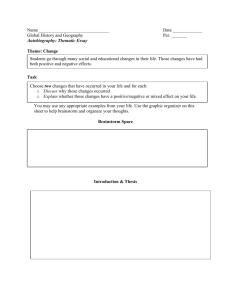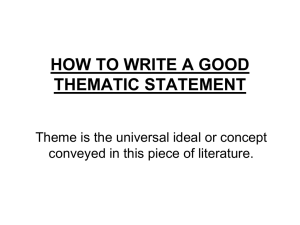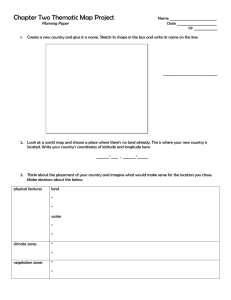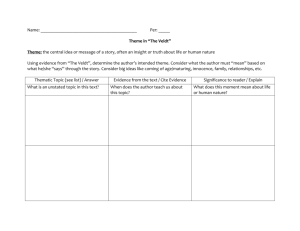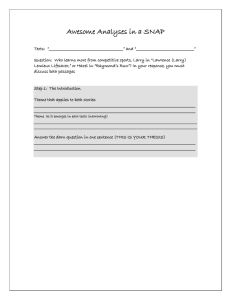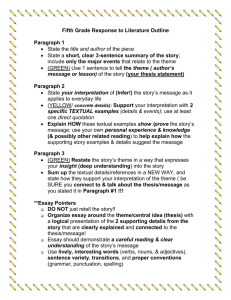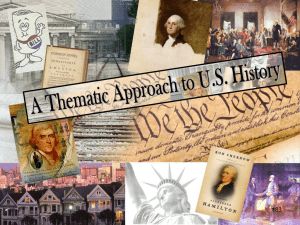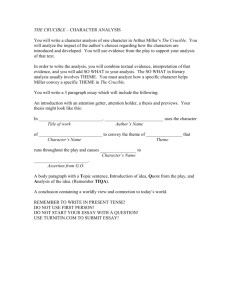Thesis Statements
advertisement
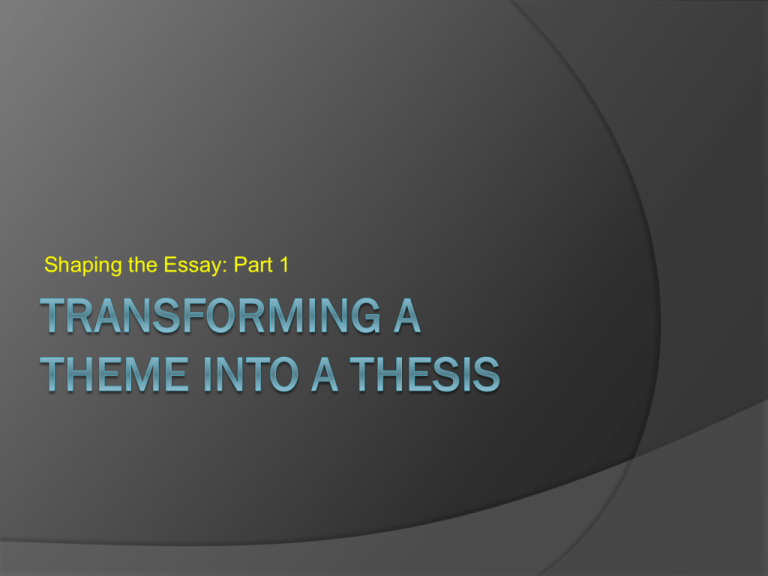
Shaping the Essay: Part 1 A SYLLOGISM… An essay is about a theme (SUBJECT) An essay communicates through a thesis (METHOD) Therefore, a thesis communicates the theme of an essay Seems simple, right? A universal thematic statement: is a statement that can apply to just about anyone describes a conflict, circumstance, or topic that a general audience can relate to does not include statements about literature (or other work of art) UNIVERSAL THEMATIC STATEMENTS The following is a list of common, universal themes: SUBJECT MEANING Alienation Feeling alone or separate from the group. Pursuit of Goals Doing what you must to accomplish something. Hope and Disillusionment Anticipating something only to discover what you want is impossible. Reality and Illusion What is real versus what you wrongly think is real. Tradition and Change Moving from usual, comfortable practice to new methods. Relationships How individuals get along in all circumstances. Censorship Preventing the population from learning information that may harm them. Human Interaction The importance of authentic contact with others. SAMPLE UNIVERSAL THEMATIC STATEMENTS Long held beliefs and values rarely change unless stimulated by a dramatic event. When torn between two separate worlds, each with its own set of values, individuals must work to find their own true beliefs. A child’s sense of identity comes from interacting with others; If no positive role model is available, the child may never reach his true potential. UNIVERSAL THEMATIC STATEMENTS To compose a well-developed universal thematic statement, consider various aspects of a topic. Do this by asking your self several questions. What is the topic? Why is the topic an important issue? Who does the topic involve? How does the topic affect the average person? What problems or issues arise because of this topic? How does the topic affect the way society functions? UNIVERSAL THEMATIC STATEMENTS If your topic is the generation gap, you might ask yourself the following questions to gain an understanding of the topic and uncover some of its complexities. What is the generation gap? Why is the generation gap an important issue? Who does the generation gap involve? How does it affect the average person? What problems or issues arise because of this topic? How does it affect the way society functions? Answers to such questions will quickly uncover the complexity of this topic. UNIVERSAL THEMATIC STATEMENT After your question and answer exercise, you may be able to express the topic as an extended universal thematic statement, such as in the following example: When individuals of successive generations disagree about essential beliefs and values, the resulting gap in communication has a destructive effect on their relationship as well as how society functions. The following chart has some helpful hints for writing universal thematic statements. Do… Well-Written Statements express the theme as a general comment on a subject. People with realistic goals tend to be more successful than those who put little thought into their future. express the theme in your own words. People who commit crimes may be punished in unexpected ways. express the theme as an insight into life. Gossip can cause serious damage to a person’s reputation. use qualifying words in a universal thematic statement, such as sometimes, can, may, and often. Poverty may transform honest people into criminals. draw a general insight from a character’s behavior. Friends are not always trustworthy. What NOT to do when writing a universal thesis statement: Do not… Poorly-Written Statements express the theme as a subject or topic. The theme is goals for the future. express the theme as an adage, cliché, or familiar saying. Crime doesn’t pay. express the theme as a moral. It’s wrong to gossip about people. make a thematic statement too Poverty always causes crime. general. Avoid broad generalizations with words such as everyone, always, never, and all. refer to specific characters in a thematic statement. Liesel Meminger learned not to trust people around her. Now that you have a universal theme that establishes the general topic of your paper, you can begin to develop your argument, which is articulated in your thesis statement. Thesis Statements Thesis: a statement with a subject and an opinion on the subject In a literary analysis essay, the thesis statement should include: 1. Author 2. Title of work(s) 3. Subject 4. Argument (opinion) Examples of thesis statements In her poem “If You Were Coming in the Fall,” Emily Dickinson uses simile, diction, and syntax to describe how people wait, hoping to fall in love. Through its contrasting river and shore scenes, Mark Twain’s Adventures of Huckleberry Finn suggests that to find the true expression of American democratic ideals, one must leave “civilized” society and go back to nature. The poems “i thank you God,” by e.e. cummings, and “The Swing,” by Robert Louis Stevenson, use visual and tactile imagery to create the sensation of movement. In Templars and Assassins, Brigid O’Neill proves that though Christians and Muslims were supposedly fighting for religious dominance in the medieval world, their motives were strongly affected by the desire for land and economic power. How to write an introduction: Think of your intro ¶ as an inverted pyramid You start broad and general at the top Then narrow to a specific focus at the bottom tip (sharp and precise) universal statement about subject theme (abstract noun) bridge theme to novel (development) thesis statement
